(Above) Superhero Sunday at Saskatoon Temple. Cpt Angela Kerr (left) leads the service dressed as her favourite superhero. From left, YPSM Sarah Rowe and CSM Kerri Cryderman join in the fun (Photos: Courtesy of Saskatoon Temple)
The Home Front is an ongoing series where we highlight the mission and ministry taking place around our territory. We will visit each Canadian province and territory, as well as Bermuda, and celebrate the innovation and impact the Army is having in corps, social services and youth ministry.
FAMILY SUNDAY IN SASKATOON
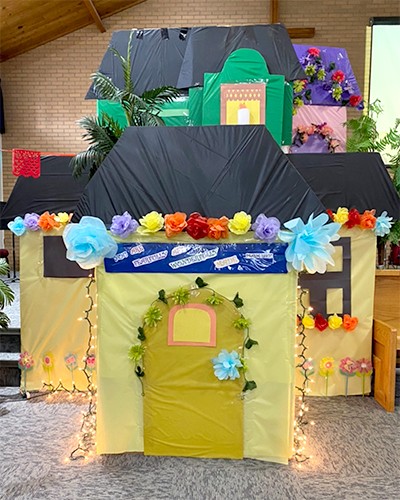
and twinkling lights, from Encanto
When the congregation at Saskatoon Temple entered the sanctuary one Sunday, they found themselves transported to the world of Encanto, the Disney movie about a Colombian family who received a miracle and now share their magical gifts with their community. A replica of their colourful casita (house), covered in flowers and twinkling lights, stood at the front of the church. It was all part of Family Sunday, a multigenerational service held once a month.
“We often divide people into age categories in the church, whether in our programs or our services—worshipping together for a short period and then sending the children out,” says Captain Angela Kerr, who serves with her husband, Captain Derek Kerr, as corps officers. “The idea behind Family Sunday was to create a corporate worship experience to bridge those gaps and learn and grow together as a community.”
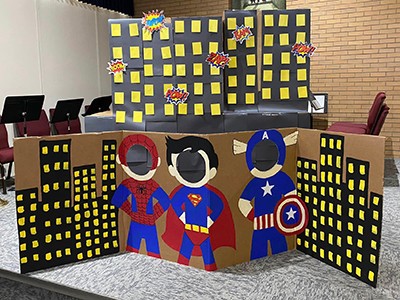
Every month, there’s a different theme. For their first service in March 2023, they built a big pirate ship, and the kids went on a treasure hunt. For superhero Sunday, everyone dressed up as their favourite superhero, including area commander Major Mike Hoeft, who came as Batman. At Pentecost, they held a birthday party to celebrate the birth of the church, with cake, balloons and party hats. In the summer, they set up tents and asked everyone to bring their own lawn chair.
“It always looks different. I tell the congregation to expect the unexpected,” says Captain Kerr. “It’s about embracing a messy environment and allowing kids to move freely within the space. We encourage movement and conversation. Some things may feel comfortable, some might feel uncomfortable, but we pray that the Spirit is felt through all of that.”
At the beginning, they anticipated that families would enjoy the fun, relaxed format, but seniors might not. Instead, the response from seniors was, “I’m so glad you’re investing in our young people. This is so important. Don’t stop!” says Captain Kerr.
Welcoming children to participate in the life and ministry of the church and building relationships between generations is a key aspect of faith formation. Children are never too young to be involved—as one two-year-old, who has become the official maraca distributor during the praise and worship time, shows.
“She’s found her purpose, how she fits into this community,” says Captain Kerr.
“From the youngest to the oldest, everyone has a purpose and a place within worship. And for kids, it’s not just for them to wait quietly until children’s time, and then their purpose is to leave the service. Their purpose is to be part of the learning and growing that’s happening within this community.”
THE GRANNY BRIGADE IN MOOSE JAW, SASK.

In Moose Jaw, Sask., The Salvation Army serves breakfast five days a week for people who are vulnerable or experiencing homelessness. The meal program began in 2020, during the COVID-19 pandemic, but has continued, with about 45-50 people coming every day. They receive a warm welcome from the volunteers—five seniors from the corps, known to some as “the granny brigade.” On Mondays and Tuesdays, it’s Bev Hammond and Sue Wendzina.
“They know our clients by name, and they banter back and forth. Most of our clients look up to them as if they were their grandmothers,” says Tammi Pinay-Ross, community ministries worker. “If our seniors aren’t here one day, our clients ask where they are and if they’re OK. It’s really great to have that camaraderie.”
When asked why she started volunteering and why she keeps coming back, Hammond says simply, “Because they’re still hungry.”
On one particular morning, she’s keeping an eye on a man who needed a place to sleep.
“We’ve got a chap in the office right now—we’ll give him 20 more minutes to sleep. He’s without a job. He’s hungry and he’s tired,” she says. “I asked him, ‘Are you on the street?’ And he said yes. It’s terrible to think that they have no place to go home.”
Wendzina agrees. “It’s sad to see that there are so many people who are homeless, which I didn’t know until I started volunteering,” she says. “It opened my eyes to what is really going on in the community.”
Pinay-Ross says they’re always watching out for people.
“If they notice that someone doesn’t have gloves or socks, or needs clothing, they’ll come and ask, ‘Do you have a minute?’ and they’ll sit with them and see if we can help them get some warm clothes or a jacket,” she says.
But Hammond and Wendzina also get a lot of joy out of volunteering, as they laugh and joke around with the clients.
“We treat them like we would our own children, even if that means telling them to pull up their pants,” says Wendzina.
“They really do appreciate that you care enough to say it,” adds Hammond.
MONDAY NIGHT MEETINGS IN NIPAWIN, SASK.
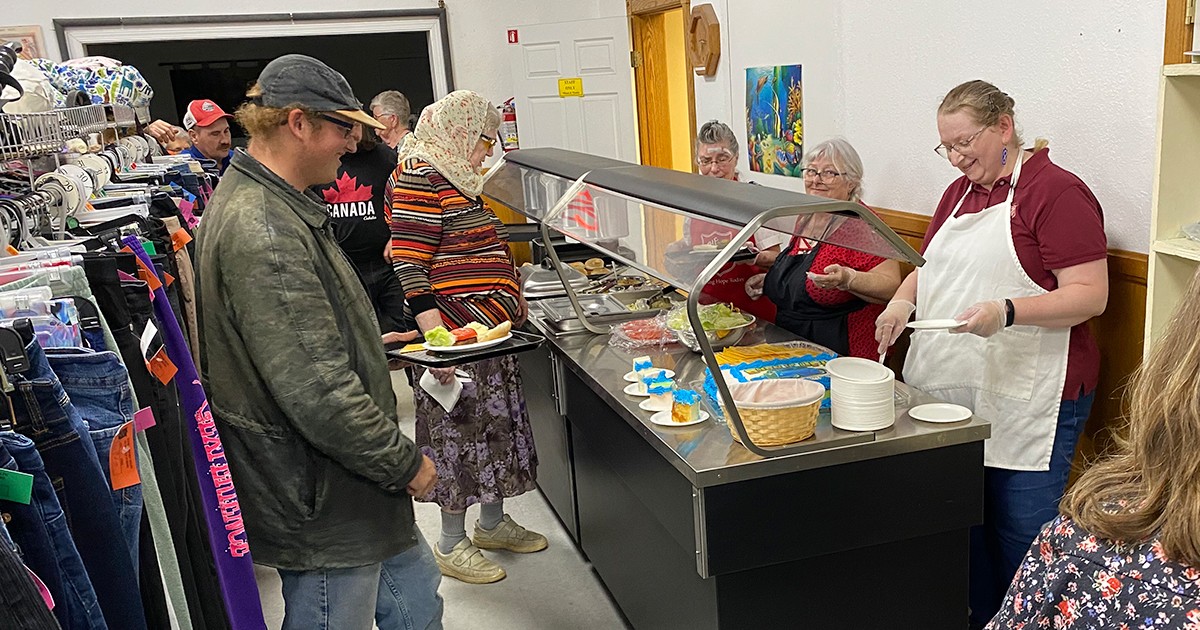
Over the years, the corps in Nipawin, Sask., struggled to find the right time to meet. As part of a circuit with Melfort and Tisdale, the corps officer arrived in Nipawin at 7 p.m. on Sunday, which was too late for some members of the congregation. They tried 4 p.m., but attendance continued to dwindle. Something had to change.
“The first time we held a service on Monday evening was in the middle of a snowstorm in January,” says corps leader Ken Green. “It was cold and dark. But we had 17 people come out. From there, it started to grow.”
They also experimented with different formats, including the Alpha course and other video series, before settling on a meal, music, prayer and a message.
“I think it’s easier for people to come to church on a Monday because the atmosphere is different. You’re sitting around tables—it’s more relaxed,” says Green. “And some people work on Sundays.”
Today, about 40-50 people attend each week. Many first learned about the service from the delicious smell wafting through the thrift store on Mondays.
“When they ask about it, we say we’re having church tonight, with a meal, and invite them to come,” says Green. “If they come for the food, that’s fine, because it’s something nutritious that will help them physically, as well as spiritually. We’re conscious that for some, it might be their best meal of the week.”
Friendship and fellowship also keep people coming back, not only on Mondays but throughout the week. At the thrift store, a couple of coffee tables have become a gathering place for the community, where people—many of whom live alone—can spend a few hours with friends.
“Loneliness is a big factor,” says Green. “This is their comfort place—we have quite a few regulars. If we’re going for coffee, or if we see somebody by themselves, we can sit and talk with them. It’s a ministry in itself.”
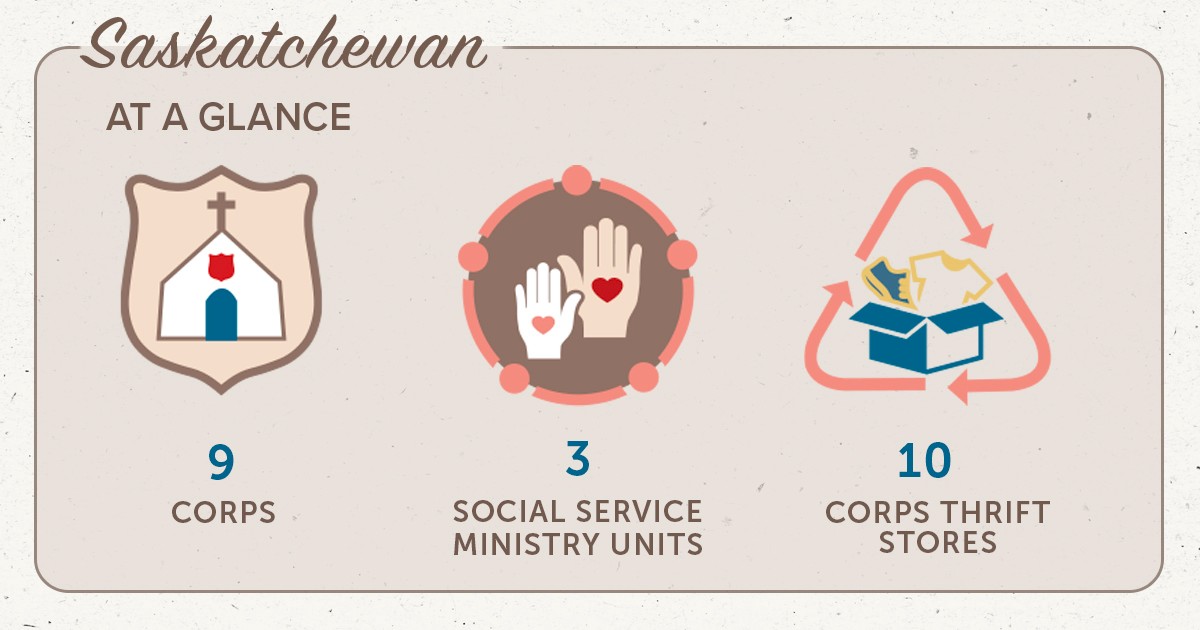

Saskatchewan
At A Glance
Lt-Colonel Donald Bladen
Divisional commander
Lt-Colonel Donna Bladen
Divisional officer personnel secretary and divisional spiritual life development secretary
9 Corps
3 Social Service Ministry Units
10 Corps Thrift Stores
3 National Recycling Operations Stores
1 Camp
This story is from:




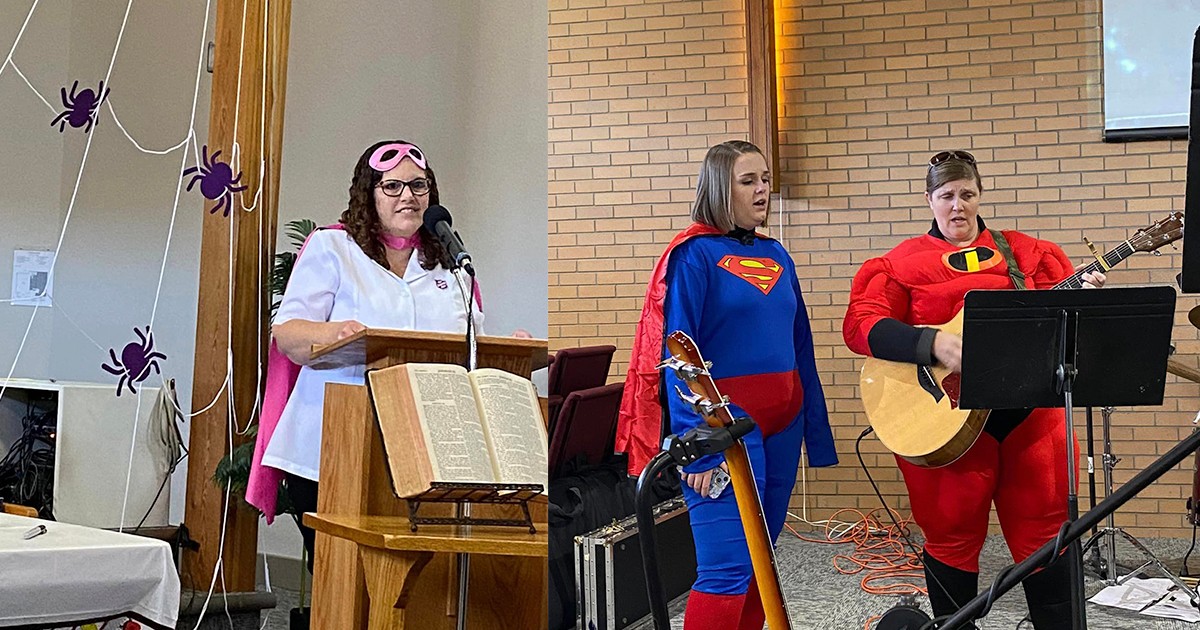





Leave a Comment